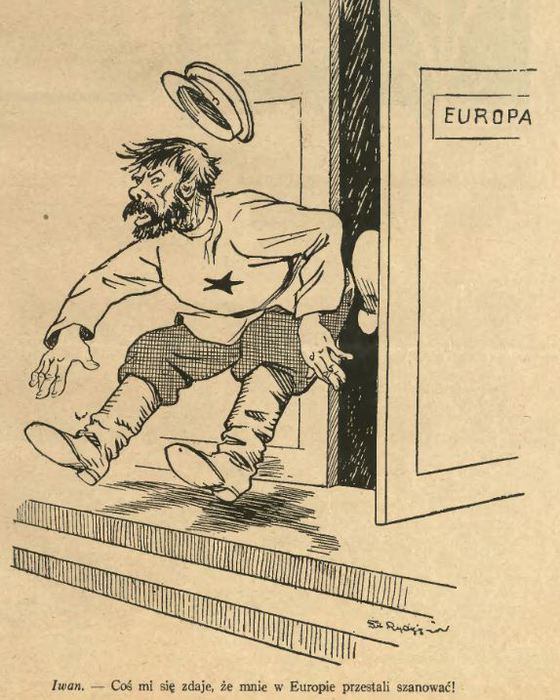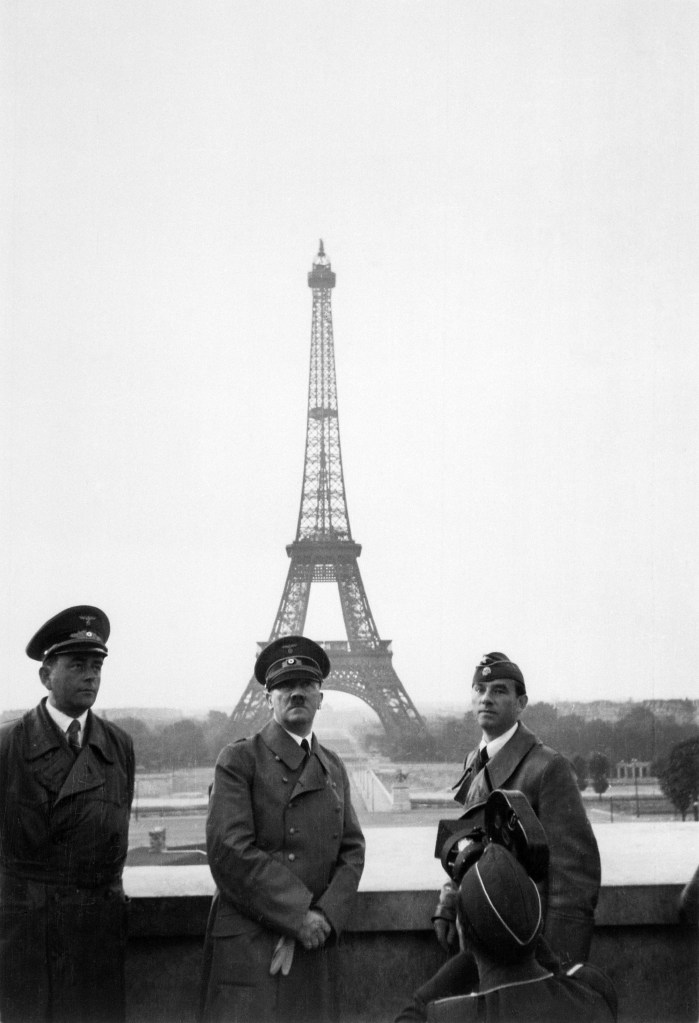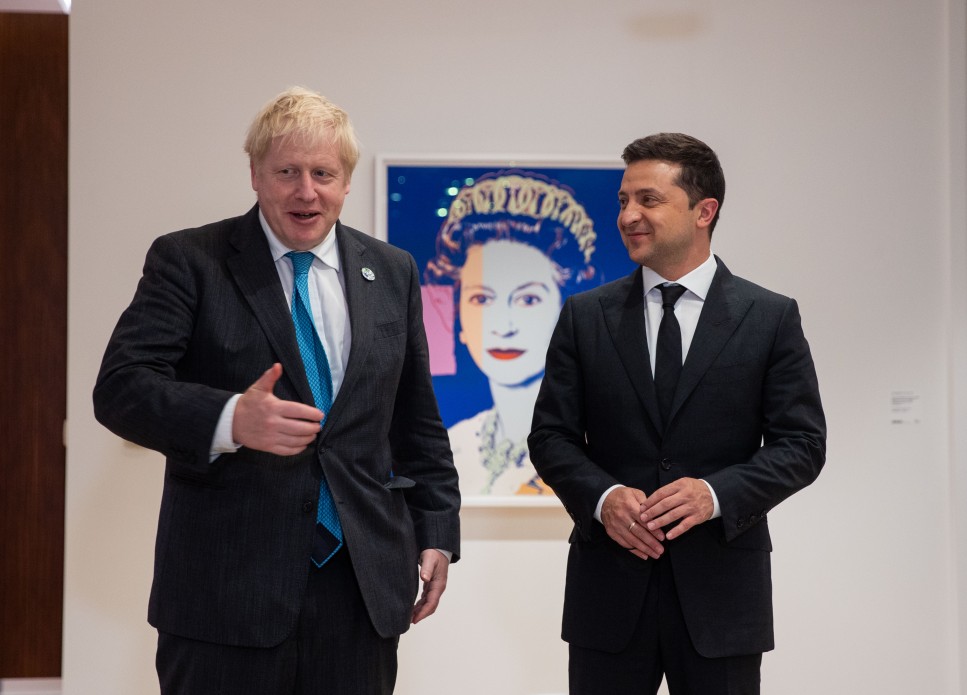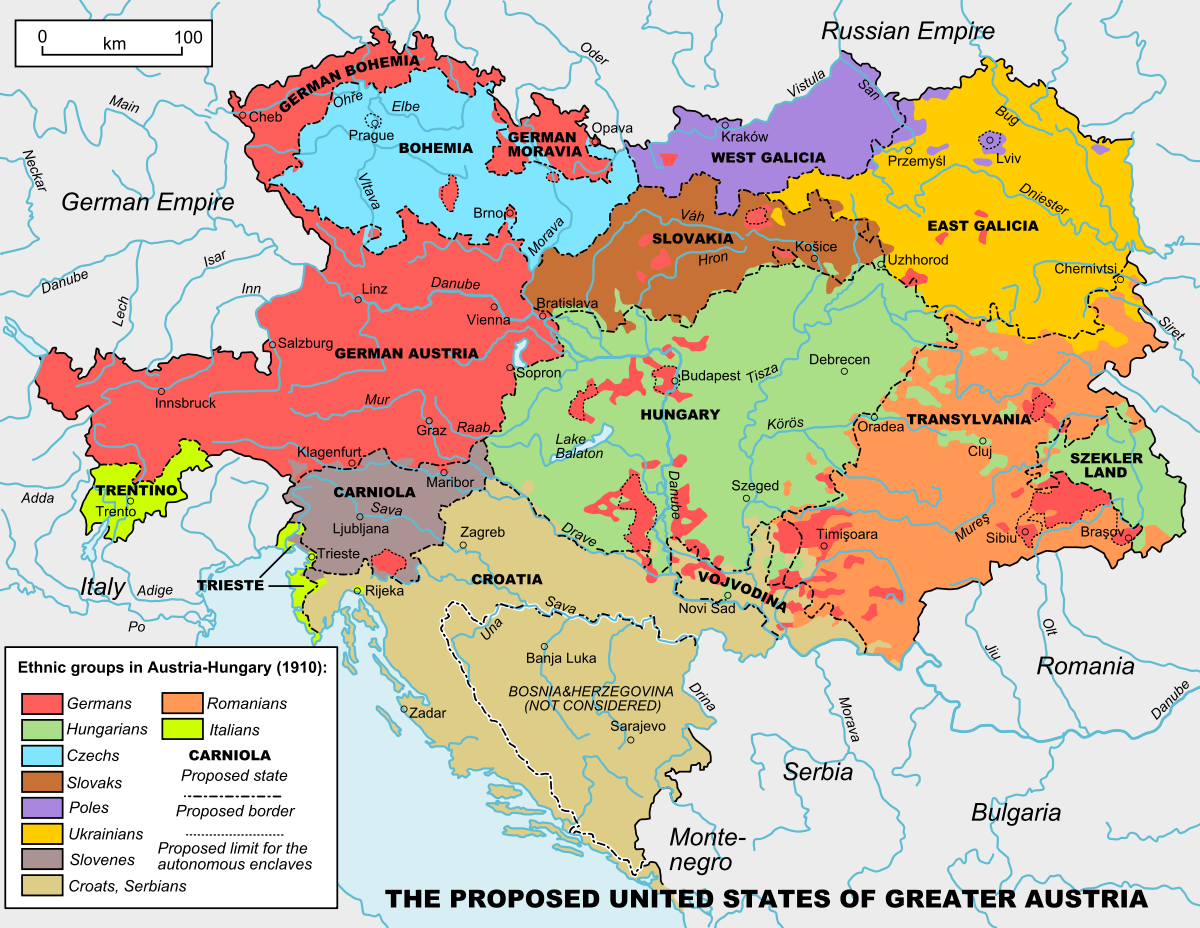Ringo
Gold Member
(Translation from ukrainian)
There are winged phrases with a national flavor that have long been in use and have become well known. If robbery, then in Italian. The murder must be purely English. A kiss is definitely French. Cutlets in Kyiv style, and the barber - in Seville. What should be the betrayal? Not a beloved, not a homeland, but a military ally?
On February 1, 2022, on the occasion of the New Year of the Tiger, the Prime Minister-loser of the United Kingdom Boris Johnson, deeply despised by the British voters, a disgrace and shame of the British Crown, visited Kyiv. It is hard to imagine that majestic London, which remembers such mastodons of world politics as Benjamin Disraeli, David Lloyd George, Winston Churchill, Clement Attlee, Anthony Eden, Harold Wilson, Margaret Thatcher, suddenly found itself under the leadership of the base.
Boris Johnson came not so much to support Ukraine as to flee London in hopes of diverting the British public's attention from a scandal that could cost him his job.
A British government official, Sue Gray, recently released a report on holiday parties and feasts at the prime minister's residence on Downing Street in the midst of a pandemic. Sue Gray concluded that the Prime Minister's Office and the government did ignore the anti-antiquity restrictions. This is something like the scandal analogous to our restaurant "Velor", when "Servants of the People" drank and had a snack in between calls to the people to strictly adhere to social distance.
By the way, a very good term is social distance. Not to be confused with the sanitary distance of one and a half meters between individuals. Social distance is the insurmountable distance that separates the poor who have to wear muzzles and takeaway fast food from the happy owners of the Gelendvagen and the 600 Mercedes, for whom the doors of all elite restaurants are always open.
British Prime Minister's Chief Political Adviser Munir Mirza was the first to announce her resignation. In her letter, she accused Johnson of misconduct. Three other top aides to Boris Johnson have resigned on February 3, 2022: Chief of Staff Dan Rosenfield, Chief Personal Secretary Martin Reynolds and Communications Director Jack Doyle.
Boris Johnson himself has proved to be a true ally of the Servant of the People party, publicly declaring that he is not going to resign and wants to remain prime minister until 2029. He promised to fight for re-election for another five years in 2024, despite the downgrade.
The anti-rating of the Prime Minister of the United Kingdom Boris Johnson, according to the sociological service YouGov, reached 73% - reports "Public" .
What brought this grandson of a Turkish citizen and Jewish relatives from Lithuania to Kyiv at this difficult time? Perhaps the former untalented journalist, who was expelled from the Times at the beginning of his career for professional incompetence, and the former untalented actor decided to discuss the prospects for the development of pop and circus art in both countries? Or a strategy for how to change the election in an environment where three-quarters of your fellow citizens saw you in a coffin in white sneakers? No, these two People's Artists decided to discuss the International Military Union of Britain, Poland and Ukraine.
Historians will not lie: any reminder of the strong military alliance between Poland and Britain cannot be accepted without irony and smiles. This time Mr. Johnson was drawn to the pathos.
"We are doing everything possible to strengthen Ukraine's ability to offer military resistance. But I think the best thing we can do is to convey to Russian citizens the possibility of what will happen. The reality of the fact that Ukrainians will defend themselves, they will fight for their country. Ukrainians will resist to the last drop of blood "
You look so smart! Just want to take him by the collar and ask: tell me, dear sir, when was the last time British soldiers fought to the death, to the last drop of English blood? Maybe in 1938 for Prague? Or in 1939 for Warsaw? Or in 1940 for Paris ?! Was it for Singapore in 1942, when British Commander-in-Chief Lieutenant General Arthur Percival personally carried a white flag to the headquarters of the bewildered Japanese? Probably, Mr. Boris meant the heroic defense of Kabul in 2021…
Because there is another side of the coin - purely English betrayal. Please tell me, at least one ally of Britain (apart from the United States, which they are simply afraid of), who would not be betrayed by the British Lion?
The American film company Netflix decided to patrol the British counterparts a bit by releasing the film "Munich. On the verge of war "about the dramatic events of the autumn of 1938.
Jokers have already started to mock: betrayed then, will betray now…
The widespread historical allegation that Britain allegedly betrayed Czechoslovakia in Munich in 1938 is a relief. In fact, Britain never betrayed Czechoslovakia, because it never undertook any military guarantees to defend Prague from Hitler's encroachments. In fact, London acted entirely as an accomplice and supporter on the side of the Third Reich, only verbally making empty promises to respect the territorial integrity of this Eastern European country. It was not Hitler or Ribbentrop, but British Prime Minister Chamberlain and French Prime Minister Daladier who did everything in their power to break Czechoslovakia's defense, intimidate and force it to surrender. This is how this event is described in detail in the historical literature.
As early as September 20, 1938, Czechoslovakia resisted with all its might. At 7.30 pm that day, the British Ambassador to Newton and the French Ambassador to Delacroix received an official response from the Czechoslovak Government requesting a review of the decisions of the British and French Governments, which had previously approved the terms of the Munich Agreement. Then London and Paris decided to talk to Prague in another language.
At 2 o'clock in the morning on September 21, Czechoslovak President Benes was raised from his bed by another arrival of Newton and Delacroix. This was their fifth visit in one day. The night guests presented Benes with an ultimatum: "If he does not accept the Anglo-French plan, the whole world will recognize Czechoslovakia as the sole culprit of the inevitable war." Worse, the envoys warned: "If the Czechs turn to the Russians for help, the war could take the form of a crusade against the Bolsheviks. Then it will be very difficult for the governments of England and France to stay away. " That is, not only will they leave Czechoslovakia to their own devices, but they will also join the attackers! This is not surprising, since Germany did not act alone, at the same time, territorial claims to Czechoslovakia were made by neighboring Poland and Hungary:
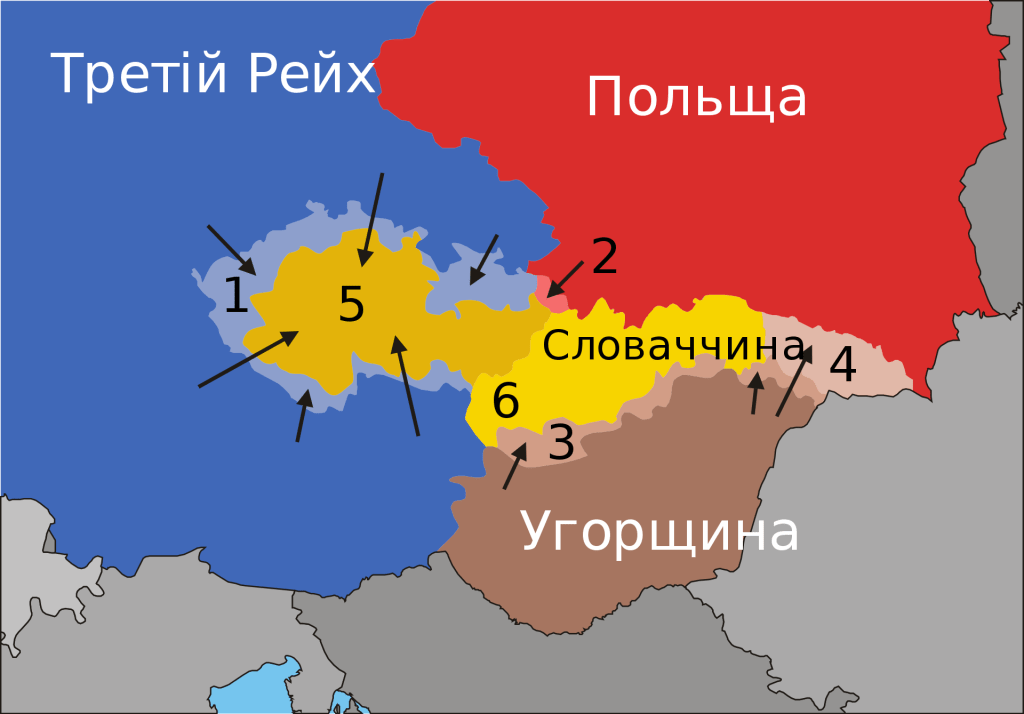
Stages of the dismemberment of Czechoslovakia:
1. Annexation of the Sudetenland by Nazi Germany (October 1-10, 1938).
2. Occupation of Zaolzie with Teszyn in Poland (October 1-2, 1938).
3. Areas with a Hungarian majority were transferred to Hungary in accordance with the First Vienna Arbitration (November 2, 1938).
4. Occupation of Subcarpathian Russia by Hungary (March 16-23, 1939).
5. Occupation of the remnants of the Czech Republic and its declaration as a protectorate of Germany (March 15, 1939).
6. Slovakia declares its independence, becoming a military ally of Germany (March 14, 1939)
In fact, the night Anglo-French ultimatum to Beneš was an act of moral rape of the Czechoslovak government by Western partners. At the same time, there were no legally binding agreements between London and Prague on joint defense against German aggression. Therefore, there is no reason to accuse the British of treason.
It was a little more difficult with the French, as they seemed to have made some commitments to Czechoslovakia, stemming from a systematic interpretation of the 1935 Franco-Soviet and Soviet-Czechoslovak agreements. At the same time, they were designed very vaguely and vaguely, in the spirit of the infamous "Budapest Memorandum of December 5, 1994". Something like holding consultations, contacting the League of Nations, and so on. Under these agreements, the USSR had the right to provide assistance to Czechoslovakia only if France provided similar assistance, and not alone. That is, all these agreements were ineffective from the beginning.
Those who believe that the Munich Agreement provided security guarantees for Czechoslovakia in the future with reduced borders are also mistaken. It is not true. The quadripartite agreement of Great Britain, France, Germany, and Italy of September 29, 1938 (signed after midnight on September 30) provided for only one thing: the complete and unconditional surrender of Czechoslovakia and the satisfaction of all territorial claims of Germany, Poland, and Hungary.
There are winged phrases with a national flavor that have long been in use and have become well known. If robbery, then in Italian. The murder must be purely English. A kiss is definitely French. Cutlets in Kyiv style, and the barber - in Seville. What should be the betrayal? Not a beloved, not a homeland, but a military ally?
On February 1, 2022, on the occasion of the New Year of the Tiger, the Prime Minister-loser of the United Kingdom Boris Johnson, deeply despised by the British voters, a disgrace and shame of the British Crown, visited Kyiv. It is hard to imagine that majestic London, which remembers such mastodons of world politics as Benjamin Disraeli, David Lloyd George, Winston Churchill, Clement Attlee, Anthony Eden, Harold Wilson, Margaret Thatcher, suddenly found itself under the leadership of the base.
Boris Johnson came not so much to support Ukraine as to flee London in hopes of diverting the British public's attention from a scandal that could cost him his job.
A British government official, Sue Gray, recently released a report on holiday parties and feasts at the prime minister's residence on Downing Street in the midst of a pandemic. Sue Gray concluded that the Prime Minister's Office and the government did ignore the anti-antiquity restrictions. This is something like the scandal analogous to our restaurant "Velor", when "Servants of the People" drank and had a snack in between calls to the people to strictly adhere to social distance.
By the way, a very good term is social distance. Not to be confused with the sanitary distance of one and a half meters between individuals. Social distance is the insurmountable distance that separates the poor who have to wear muzzles and takeaway fast food from the happy owners of the Gelendvagen and the 600 Mercedes, for whom the doors of all elite restaurants are always open.
British Prime Minister's Chief Political Adviser Munir Mirza was the first to announce her resignation. In her letter, she accused Johnson of misconduct. Three other top aides to Boris Johnson have resigned on February 3, 2022: Chief of Staff Dan Rosenfield, Chief Personal Secretary Martin Reynolds and Communications Director Jack Doyle.
Boris Johnson himself has proved to be a true ally of the Servant of the People party, publicly declaring that he is not going to resign and wants to remain prime minister until 2029. He promised to fight for re-election for another five years in 2024, despite the downgrade.
The anti-rating of the Prime Minister of the United Kingdom Boris Johnson, according to the sociological service YouGov, reached 73% - reports "Public" .
What brought this grandson of a Turkish citizen and Jewish relatives from Lithuania to Kyiv at this difficult time? Perhaps the former untalented journalist, who was expelled from the Times at the beginning of his career for professional incompetence, and the former untalented actor decided to discuss the prospects for the development of pop and circus art in both countries? Or a strategy for how to change the election in an environment where three-quarters of your fellow citizens saw you in a coffin in white sneakers? No, these two People's Artists decided to discuss the International Military Union of Britain, Poland and Ukraine.
Historians will not lie: any reminder of the strong military alliance between Poland and Britain cannot be accepted without irony and smiles. This time Mr. Johnson was drawn to the pathos.
"We are doing everything possible to strengthen Ukraine's ability to offer military resistance. But I think the best thing we can do is to convey to Russian citizens the possibility of what will happen. The reality of the fact that Ukrainians will defend themselves, they will fight for their country. Ukrainians will resist to the last drop of blood "
You look so smart! Just want to take him by the collar and ask: tell me, dear sir, when was the last time British soldiers fought to the death, to the last drop of English blood? Maybe in 1938 for Prague? Or in 1939 for Warsaw? Or in 1940 for Paris ?! Was it for Singapore in 1942, when British Commander-in-Chief Lieutenant General Arthur Percival personally carried a white flag to the headquarters of the bewildered Japanese? Probably, Mr. Boris meant the heroic defense of Kabul in 2021…
Because there is another side of the coin - purely English betrayal. Please tell me, at least one ally of Britain (apart from the United States, which they are simply afraid of), who would not be betrayed by the British Lion?
The American film company Netflix decided to patrol the British counterparts a bit by releasing the film "Munich. On the verge of war "about the dramatic events of the autumn of 1938.
Jokers have already started to mock: betrayed then, will betray now…
The widespread historical allegation that Britain allegedly betrayed Czechoslovakia in Munich in 1938 is a relief. In fact, Britain never betrayed Czechoslovakia, because it never undertook any military guarantees to defend Prague from Hitler's encroachments. In fact, London acted entirely as an accomplice and supporter on the side of the Third Reich, only verbally making empty promises to respect the territorial integrity of this Eastern European country. It was not Hitler or Ribbentrop, but British Prime Minister Chamberlain and French Prime Minister Daladier who did everything in their power to break Czechoslovakia's defense, intimidate and force it to surrender. This is how this event is described in detail in the historical literature.
As early as September 20, 1938, Czechoslovakia resisted with all its might. At 7.30 pm that day, the British Ambassador to Newton and the French Ambassador to Delacroix received an official response from the Czechoslovak Government requesting a review of the decisions of the British and French Governments, which had previously approved the terms of the Munich Agreement. Then London and Paris decided to talk to Prague in another language.
At 2 o'clock in the morning on September 21, Czechoslovak President Benes was raised from his bed by another arrival of Newton and Delacroix. This was their fifth visit in one day. The night guests presented Benes with an ultimatum: "If he does not accept the Anglo-French plan, the whole world will recognize Czechoslovakia as the sole culprit of the inevitable war." Worse, the envoys warned: "If the Czechs turn to the Russians for help, the war could take the form of a crusade against the Bolsheviks. Then it will be very difficult for the governments of England and France to stay away. " That is, not only will they leave Czechoslovakia to their own devices, but they will also join the attackers! This is not surprising, since Germany did not act alone, at the same time, territorial claims to Czechoslovakia were made by neighboring Poland and Hungary:

Stages of the dismemberment of Czechoslovakia:
1. Annexation of the Sudetenland by Nazi Germany (October 1-10, 1938).
2. Occupation of Zaolzie with Teszyn in Poland (October 1-2, 1938).
3. Areas with a Hungarian majority were transferred to Hungary in accordance with the First Vienna Arbitration (November 2, 1938).
4. Occupation of Subcarpathian Russia by Hungary (March 16-23, 1939).
5. Occupation of the remnants of the Czech Republic and its declaration as a protectorate of Germany (March 15, 1939).
6. Slovakia declares its independence, becoming a military ally of Germany (March 14, 1939)
In fact, the night Anglo-French ultimatum to Beneš was an act of moral rape of the Czechoslovak government by Western partners. At the same time, there were no legally binding agreements between London and Prague on joint defense against German aggression. Therefore, there is no reason to accuse the British of treason.
It was a little more difficult with the French, as they seemed to have made some commitments to Czechoslovakia, stemming from a systematic interpretation of the 1935 Franco-Soviet and Soviet-Czechoslovak agreements. At the same time, they were designed very vaguely and vaguely, in the spirit of the infamous "Budapest Memorandum of December 5, 1994". Something like holding consultations, contacting the League of Nations, and so on. Under these agreements, the USSR had the right to provide assistance to Czechoslovakia only if France provided similar assistance, and not alone. That is, all these agreements were ineffective from the beginning.
Those who believe that the Munich Agreement provided security guarantees for Czechoslovakia in the future with reduced borders are also mistaken. It is not true. The quadripartite agreement of Great Britain, France, Germany, and Italy of September 29, 1938 (signed after midnight on September 30) provided for only one thing: the complete and unconditional surrender of Czechoslovakia and the satisfaction of all territorial claims of Germany, Poland, and Hungary.
